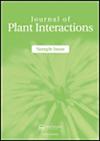SlMX1基因的组成性表达提高了转基因番茄的产量和品质,增加了促进健康的化合物,提高了对真菌的抗性,并延缓了番茄的成熟
IF 3.3
3区 生物学
Q2 PLANT SCIENCES
引用次数: 5
摘要
番茄是主要的经济驯化作物之一,在世界范围内以不同的方式和目的得到广泛的应用。细胞代谢是维持生命的所有生物过程的核心,包括细胞生长、分化、维持和对环境应激的反应。为了评估基因工程如何改善番茄果实代谢组,我们将两种转基因番茄(SlMX1过表达系和RNAi系)的转录组学和代谢组学数据集与野生型进行了比较。综合结果表明,SlMX1的组成性表达不仅增加了几项研究中所述的毛状体形成、类胡萝卜素和萜类,而且还上调和下调了与细胞生长(细胞壁更新)、初级(碳水化合物、维生素和植物激素)和次级(苯丙素、类胡萝卜素和萜类)代谢、细胞信号传导和应激反应相关的多种基因的表达。这些由SlMX1组成性表达引起的基因表达变化促进了果实产量和品质等最重要的农业经济性状,促进了促进健康的植物化学物质(包括酚酸、黄酮类和花青素)的生物合成,并最终激活了对葡萄灰霉病的抗性,抑制了过熟相关基因的表达,从而延长了果实的保质期。综上所述,SlMX1过表达所实现的性状改良可以在分子育种计划中加以利用,以改造果实的大小和产量,诱导促进健康的次生代谢产物,提高真菌抗性,最终延长果实的货架期。本文章由计算机程序翻译,如有差异,请以英文原文为准。
Constitutive expression of SlMX1 gene improves fruit yield and quality, health-promoting compounds, fungal resistance and delays ripening in transgenic tomato plants
ABSTRACT Tomato is one of the major economically domesticated crops, and it is extensively used in different ways and purposes worldwide. Cell metabolism is the central core of all the biological processes to sustain life including cell growth, differentiation, maintenance, and response to environmental stress. To evaluate how genetic engineering can improve tomato fruit metabolome, the transcriptomic and metabolomic datasets of two transgenic tomatoes (SlMX1 overexpression and RNAi lines) have been compared with wild-type. The combined results demonstrated that the constitutive expression of SlMX1 not only increased trichome formation, carotenoids, and terpenoids as has been stated in several studies, but has also up- and down-regulated the expression of multiple genes related to cell growth (cell wall turnover), primary (carbohydrates, vitamins, and phytohormones), and secondary (phenylpropanoids, carotenoids, and terpenoids) metabolism, cell signaling, and stress responses. These changes in gene expression due to the constitutive expression of SlMX1 promote the most important agroeconomic traits such as fruit yield and quality, biosynthesis of health-promoting phytochemicals (including phenolic acids, flavonoids, and anthocyanins), and finally, activate resistance to Botrytis cinerea and repress the expression of over-ripening-related genes, thus extending the fruit shelf-life. In conclusion, the traits improvement achieved by SlMX1 overexpression can be harnessed in molecular breeding programs to engineer fruit size and yield, induce health-promoting secondary metabolites, promote fungal resistance, and finally extend the fruit shelf-life.
求助全文
通过发布文献求助,成功后即可免费获取论文全文。
去求助
来源期刊

Journal of Plant Interactions
PLANT SCIENCES-
CiteScore
5.30
自引率
6.20%
发文量
69
审稿时长
>12 weeks
期刊介绍:
Journal of Plant Interactions aims to represent a common platform for those scientists interested in publishing and reading research articles in the field of plant interactions and will cover most plant interactions with the surrounding environment.
 求助内容:
求助内容: 应助结果提醒方式:
应助结果提醒方式:


